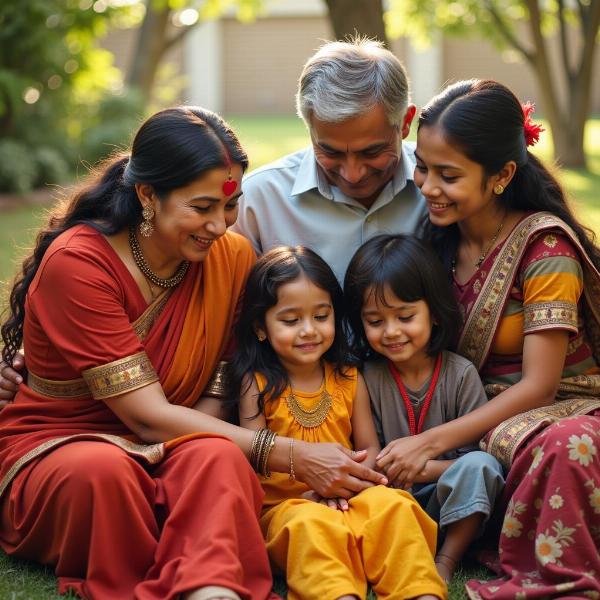Understanding the nuances of addressing elders in Hindi is crucial for navigating Indian culture with respect and grace. While “elder one meaning in Hindi” might lead you to a simple translation, the reality is far more complex and deeply intertwined with societal norms and familial relationships. This article delves into the various ways to refer to elders in Hindi, exploring the cultural significance behind these terms and providing practical examples to enhance your communication.
Different Ways to Say “Elder One” in Hindi
Hindi, like many Indian languages, boasts a rich vocabulary for addressing elders, reflecting the deep-rooted respect for seniority. These terms go beyond mere age and often signify familial roles, social standing, and the degree of formality. Let’s explore some common expressions:
-
बड़े (bade): This is a general term for “elder” and can be used for both men and women. It’s a respectful way to address someone older than you, but lacks the specific familial connection of other terms.
-
बुज़ुर्ग (buzurg): This term carries a greater sense of reverence and is typically used for very elderly individuals, implying wisdom and experience.
-
वृद्ध (vriddha): Similar to “buzurg,” this word emphasizes old age and is often used in formal contexts.
-
दादा जी (dada ji): Used for paternal grandfather, this term embodies love and respect.
-
दादी जी (dadi ji): Used for paternal grandmother, signifying affection and reverence.
-
नाना जी (nana ji): Maternal grandfather, conveying warmth and respect.
-
नानी जी (nani ji): Maternal grandmother, expressing fondness and honor.
-
चाचा जी (chacha ji): Paternal uncle, reflecting familial closeness and respect.
-
चाची जी (chachi ji): Paternal aunt, showing familial affection and respect.
-
मामा जी (mama ji): Maternal uncle, indicating familial bond and respect.
-
मामी जी (mami ji): Maternal aunt, conveying familial warmth and respect.
 Family gathering with elders
Family gathering with elders
The Cultural Significance of Addressing Elders Respectfully
Respect for elders is a cornerstone of Indian culture. Addressing them with appropriate terms is not just a matter of politeness but a demonstration of deep-rooted cultural values. This respect is ingrained from childhood and manifests in various customs, such as touching the feet of elders as a sign of reverence.
Choosing the Right Term
Selecting the correct term depends on several factors: your relationship with the elder, the level of formality, and the specific regional dialect. Using the wrong term can be considered disrespectful, so it’s essential to observe and learn from those around you.
Beyond Words: Showing Respect Through Actions
While using the correct terminology is crucial, respect also extends to actions. Offering elders a seat, assisting them with tasks, and listening attentively to their advice are all essential components of demonstrating genuine reverence.
What if I’m Unsure Which Term to Use?
When in doubt, it’s always best to err on the side of formality. Using “ji” as a suffix adds a layer of respect and can be used with most terms. If you’re unsure about the appropriate familial term, using “buzurg” or “bade” is generally acceptable.
Elder One Meaning in Hindi: A Deeper Understanding
So, while a direct translation of “elder one meaning in Hindi” might yield a simple word, understanding the cultural context reveals a much richer tapestry of language and tradition. By using the appropriate terms and demonstrating respect through your actions, you can build stronger relationships and navigate Indian culture with sensitivity and understanding.
FAQ:
- What is the most common way to say “elder one” in Hindi? The most common terms are “bade” and “buzurg.”
- Is it disrespectful to use the wrong term for an elder? Yes, using an inappropriate term can be seen as a sign of disrespect.
- How can I learn the correct terms to use? Observe how others address elders and don’t hesitate to ask for guidance.
- Besides using the right words, how can I show respect to elders? Offer them your seat, assist them with tasks, and listen attentively to their advice.
- What if I’m not related to the elder? Use “buzurg” or “bade” along with “ji” for a respectful address.
- Does the meaning change based on region? Yes, some terms might have slightly different connotations or usage in various regions of India.
- Is it okay to address elders by their first name? It’s generally considered disrespectful to address elders by their first name unless specifically invited to do so.
Related Articles:
Meaning-Hindi.in is your premier destination for professional Hindi translation services. We specialize in business, legal, technical, website localization, educational, and specialized translations, offering fast and accurate services to meet your unique needs. Whether you need to translate important documents or wish to bridge the communication gap with Hindi speakers, our expert team is here to assist you. Contact us today at [email protected] or call us at +91 11-4502-7584. Meaning-Hindi.in – Bridging the language gap, connecting cultures.